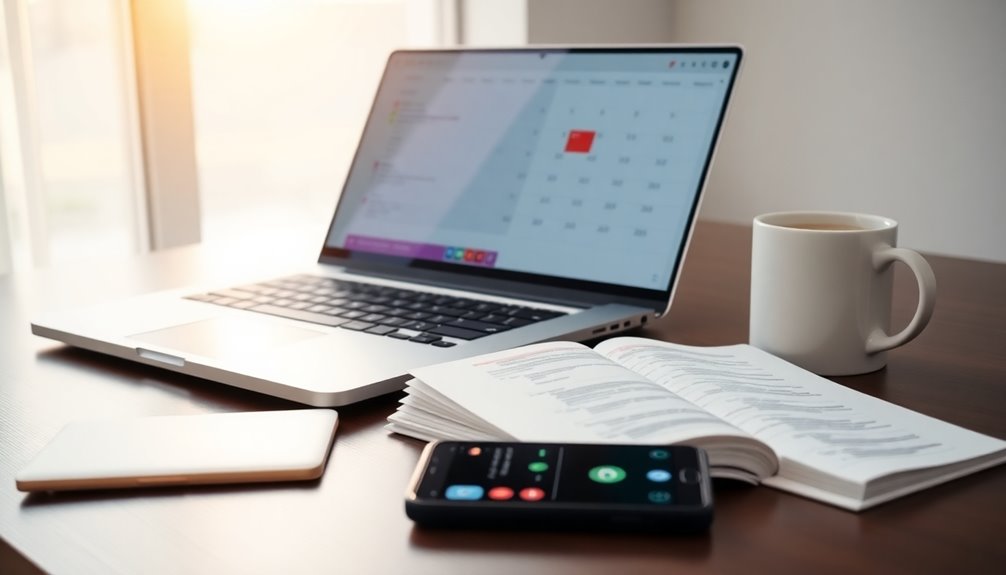To guarantee your internship success, start by asking crucial questions. Inquire about the company's culture and core values to see if you fit in. Clarify your daily responsibilities and how your performance will be evaluated. Don't forget to ask about learning opportunities, such as training programs and mentorship. It's also important to understand how successes are celebrated and whether there are chances for future roles within the organization. These questions will guide your experience and help you make a positive impact. Explore further to uncover even more insights that will set you up for success.
Key Takeaways
- Research the company's mission and values to ensure alignment with your career goals and cultural fit.
- Prepare specific questions about daily tasks and responsibilities to understand what is expected from you as an intern.
- Inquire about learning and development opportunities, such as training and mentorship, to enhance your skills during the internship.
- Ask about team dynamics and the work environment to gauge how well you would integrate into the team.
- Clarify performance evaluation methods to understand how your contributions will be assessed throughout the internship.
Importance of Internship Interviews

Understanding the importance of internship interviews can greatly impact your career trajectory.
These interviews offer you a unique chance to gain insight into a company's culture, helping you determine if it's the right fit for your values and work style. They also evaluate whether your skills and experiences align with the role, giving you a platform to showcase your strengths.
Furthermore, internships set expectations, clarifying what you'll be doing and what the company expects from you.
Finally, these interviews serve as an excellent opportunity for networking, allowing you to build professional connections that might benefit you in the future.
Recognizing these aspects of the interview process is essential for making informed decisions in your career journey.
Preparing for the Interview

After recognizing the significance of internship interviews, it's time to focus on how to prepare effectively. Start by researching the company's background and values to understand their mission. Review the job description closely to identify required skills and responsibilities. Here's a quick reference table to help you organize your prep:
| Task | Purpose | Tips |
|---|---|---|
| Research the company | Understand their culture | Visit their website, read reviews |
| Review the job description | Know what's expected | Highlight key skills needed |
| Prepare questions | Show your interest | Tailor questions to the role |
Practice common interview questions to boost your confidence, and remember to dress appropriately for the company culture. This preparation helps you make a strong impression and shows you're serious about the opportunity. Understanding emotional regulation can also enhance your ability to respond effectively during the interview process.
Inquiring About Company Culture

One of the essential aspects of an internship interview is inquiring about company culture. This helps you determine if the environment aligns with your values and work style.
Ask questions like, "How would you describe the work environment?" or "What values are most important to the organization?" Understanding how the team celebrates successes and the management style can also provide valuable insights.
Additionally, inquire about opportunities for social interactions among interns, as these can enhance your experience. By exploring company culture, you're not only evaluating fit but also demonstrating your genuine interest in becoming part of the team.
This proactive approach can help you make a more informed decision about your internship choice. Engaging with the team can also boost your vibrational energy and enhance your overall internship experience.
Understanding Job Responsibilities

As you evaluate company culture, it's equally important to clarify your specific job responsibilities during the internship. Understanding what's expected from you can greatly impact your experience.
Start by asking about the primary tasks you'll handle daily. Find out how your performance will be evaluated and the types of projects interns typically work on.
It's also helpful to inquire if there are opportunities for you to take on leadership roles or contribute to the company's goals. This knowledge will help you align your efforts with the organization's objectives and set realistic expectations.
Learning and Development Opportunities

Learning and development opportunities play an essential role in enhancing your internship experience. To make the most of your time, ask about the training programs available for interns. These resources can greatly boost your skills and knowledge.
Don't overlook mentorship opportunities; having a mentor can provide invaluable guidance and insights. Additionally, inquire about the frequency of feedback you'll receive on your work. Regular feedback helps you understand your progress and areas for improvement.
Look for workshops or seminars that can further develop your abilities. By exploring these opportunities, you'll not only gain practical experience but also demonstrate your commitment to growth, making you a more attractive candidate for future roles.
Addressing Intern Challenges

While enhancing your skills through learning and development opportunities is important, it's equally essential to understand the challenges you might face during your internship. Common hurdles include adjusting to a new work environment, managing your time effectively, and communicating with coworkers. Knowing these challenges prepares you better for what lies ahead. Engaging in hands-on learning can help you adapt and build confidence in your new role.
| Challenge | Strategy to Overcome |
|---|---|
| Adjusting to company culture | Observe and ask questions |
| Time management | Use planners and set priorities |
| Communication barriers | Practice active listening |
| Seeking feedback | Schedule regular check-ins |
Evaluating Performance Expectations

Understanding how your performance will be evaluated during your internship is essential for your success. Start by asking your supervisor about the evaluation methods and criteria. Knowing how often feedback is provided—whether weekly, monthly, or at the end—will help you stay on track.
Inquire about the specific skills or outcomes they'll assess, as this clarity can guide your focus. Don't hesitate to request examples of past evaluations to understand expectations better.
Establishing a routine for check-ins can also facilitate ongoing dialogue about your performance. Remember, being open to feedback shows your commitment to improvement and professional growth.
Exploring Future Opportunities

Interns often wonder about future opportunities that may arise after their internship ends. It's important to ask your supervisor about the potential for full-time employment. Inquire about the typical career paths for interns who excel and how evaluations influence future roles.
Understanding the percentage of interns who receive job offers can guide your expectations.
Additionally, explore if the company has an alumni network for former interns. Networking can open doors to job opportunities and mentorship. Attend events and engage with professionals to showcase your work and build connections.
You may also want to discuss how your internship experience aligns with Software Quality Assurance principles, which can enhance your credibility in the field.
Frequently Asked Questions
What Is the Company's Dress Code for Interns?
When you're preparing for your internship, it's essential to know the company's dress code.
You might find that some organizations prefer business casual, while others lean towards more formal attire. Make sure you ask about specific expectations during the interview.
Dressing appropriately not only shows respect for the company culture but also helps you feel more confident as you start your new role.
Don't underestimate the impact of first impressions!
Are Interns Allowed to Work Remotely?
Imagine you're a digital nomad, laptop in hand, ready to work from anywhere.
When it comes to internships, you'll want to ask if remote work is allowed. Companies often have different policies, so clarifying this can help you plan effectively.
Some might embrace flexibility, while others may require you to be on-site.
Don't hesitate to find out what the expectations are, ensuring you choose an internship that aligns with your lifestyle.
What Tools and Technology Do Interns Use?
When considering what tools and technology you'll use as an intern, think about the specific role and industry.
You might engage with software for project management, communication platforms like Slack or Microsoft Teams, and design programs like Adobe Creative Suite.
Familiarize yourself with data analysis tools or coding environments if relevant.
Being adaptable and open to learning new technologies will enhance your effectiveness and integration into the team, making your experience even more valuable.
How Can Interns Provide Feedback About Their Experience?
Think of it like the wild west of career building: feedback can shape your experience.
To provide feedback, you can have open discussions with your supervisor or mentor about your journey. Use surveys or suggestion boxes if available.
Don't hesitate to share your thoughts during team meetings, too. Your insights help improve the internship program and show your investment in your growth.
Are There Any Social Events Planned for Interns?
Yes, there are often social events planned for interns!
These gatherings create a great opportunity for you to connect with fellow interns and employees, making it easier to forge professional relationships.
You'll likely find events like mixers, team-building activities, or casual lunches.
Participating in these events not only helps you feel more integrated into the company culture but also allows you to network and share experiences with your peers.
Conclusion
To summarize, asking the right questions during your internship interviews can greatly influence your experience. Did you know that 70% of interns who actively engage with their interviewers report higher job satisfaction? By inquiring about company culture, responsibilities, and growth opportunities, you not only showcase your enthusiasm but also guarantee the internship aligns with your career goals. So, go in prepared and confident, and make the most of this vital step in your professional journey!









